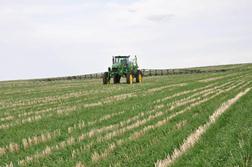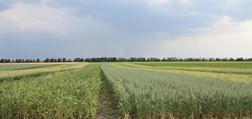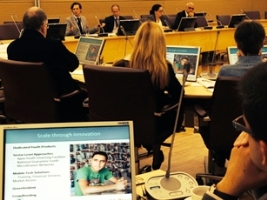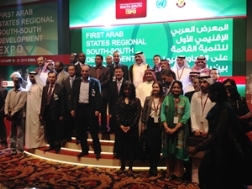
South-South and triangular cooperation in the Near East, North Africa and Europe reaches new heights: Highlights from the first-ever Arab States Regional South-South Development Expo in Doha, Qatar
 Whether giving young people access to financial services, introducing new sustainable agricultural practices like “conservation agriculture”, providing food policy-related recommendations, or sharing lessons learned across regions, IFAD-funded programmes are successfully encouraging South-South and Triangular cooperation and knowledge exchanges.
Whether giving young people access to financial services, introducing new sustainable agricultural practices like “conservation agriculture”, providing food policy-related recommendations, or sharing lessons learned across regions, IFAD-funded programmes are successfully encouraging South-South and Triangular cooperation and knowledge exchanges.
In this newsletter, we take a look at several featured programmes—all part of IFAD’s ongoing efforts—that were presented at the first-ever Arab States Regional South-South Development Expo in Doha, Qatar.
Here’s a brief snapshot:
Youth employment is a hugely important issue. But often, young people do not have the access they need to financial services—a factor that severely limits their ability to thrive in the marketplace. For this reason, the IFAD-funded Rural Youth Economic Empowerment Program (RYEEP) is helping local financial institutions in Egypt, Yemen, Morocco and Tunisia provide youth-friendly financial and non-financial services.
Farmers want to maximize harvest. But to thrive in the long-term, environmental health must be taken into account. Thanks to IFAD’s investment in the Republic of Moldova, sustainable agricultural practices—so-called “conservation agriculture”—are now being used to maximize harvest while protecting the environment.
What links conflict, food security, poverty and rural development? IFAD set out to answer this complex question with an innovative grant project entitled “Decreasing Vulnerability to Conflict in the Near East and North Africa through Rural Development.” The project’s findings will be used to provide policy-related recommendations.
When working with a large number of agriculture and rural development projects spanning many topics in a range of countries, the question arises: How do you best manage and share knowledge, information and experience, so as to enhance overall performance and effectiveness? IFAD answered with a first-of-its-kind project to establish a regional network. Called the Knowledge Access for Rural Inter-connected Areas Network (KariaNet), the Network makes use of ‘open access principles’, and applies ICT and non-ICT tools to making knowledge available to stakeholders.
If a farmer benefits from an innovative technique, it only makes sense to share this knowledge with other farmers facing similar challenges. That is the reasoning behind The South-South and Triangular Cooperation for Agricultural Development and Enhanced Food Security programme implemented in the Near East, North Africa and Europe (NEN) regions. Targeting 1,000 young people and women working in agriculture in Algeria, Morocco, Turkey and Uzbekistan, the programme fosters knowledge exchanges and other forms of cooperation. Thus, participating farmers will be able to share new, tried-and-true solutions for saving water, cultivating water-efficient crops and breeding cattle.
Useful links:
Using online tools and a new blog to understand food security and build resilience to conflict: IFAD and IFPRI launch the Arab Spatial Tool
 |
||
Policies, programmes and projects that improve food security are likely to reduce conflict. Improving policies and interventions will require more and better information, monitoring and evaluation |
Conflicts, natural disasters, and global spikes in food prices seriously impact food security for the rural poor. In the face of crises like these, what can Arab region countries do to make sure that those who are most vulnerable have enough to eat and become more resilient in the long term?
One answer is an innovative online decision-making tool launched earlier this year under the rubric of the large NENA Regional Grant, “Reducing vulnerability to conflict in the NENA region through rural development”. Developed by IFAD, the International Food Policy Research Institute (IFPRI), and the CGIAR Research Program on Policies, Institutions and Markets (PIM), the “Arab Spatial Development and Food Security Information Tool” is designed to provide food security and development-related information in the Arab world.
The Arab Spatial Tool was introduced along with other research findings as part of IFAD’s contribution to this NENA Regional Grant. It was launched at IFAD’s Close Up event in January 2014, and presented when IFAD participated in a high-level IFPRI2020 food security conference in Ethiopia in May 2014.
The sophisticated online access to information about food security and development provided by the Arab Spatial Tool will support decision- and policy-making in the Arab world, said Khalida Bouzar, Director of the Near East, North Africa and Europe Regional Division at IFAD. “What we are after, is to figure out how we can apply research to development,” Khalida Bouzar said. “How can research findings be used on the ground?”
After all, when it comes to political crises and food insecurity, causes are complex. For example, while political crises certainly lead to food insecurity, a lack of reliable nutrition and food security can also be one cause of conflict. (Notably, food insecurity was one of the factors that led to the Arab awakening, during which people took to the streets demanding “more bread, dignity and justice”).
The Arab Spatial tool takes this complexity into account as it analyzes food availability, accessibility, stability, and individuals’ nutritional status. Allowing users to click through the Arab world, map by map, the tool also provides access to data on macro-economics, governance, trade, agriculture, water, energy, poverty, health and nutrition, and much more.
 |
||
More regional cooperation is needed to overcome some of the current challenges in the Arab region |
Downloadable and pre-made graphs tell narrative stories about Arab nations’ development, while customized analytical tools allow users to compare and explore data according to region or year. New multi-layer maps dynamically track IFAD development projects geographically, while taking into account some 200 food security indicators. In addition, a new Iraq and Yemen spatial tool has been customized for more targeted country-level information.
Most recently, the Arab Spatial tool was expanded. Now, it includes even more information, including a new blog: The Arab Food and Nutrition Security blog. Co-financed by the same IFAD grant, the Arab Food and Nutrition Security blog aims to help inform the debate about food and nutrition security in the region. It will do so by providing both expert opinions and a platform for debate that spans the Arab World.
Launched in October 2014 during an event focusing on food security in the Arab world held in conjunction with FAO/IFPRI/UN and ESCWA as part of the Committee on World Food Security, the Arab Food and Nutrition Security blog holds much promise.
After all, regional interagency collaboration is emerging as a powerful mechanism to enhance institutional effectiveness and impact on the ground. In the Arab World in particular, more regional collaboration is needed to build resilience to crises. Thus, the blog’s platform is particularly relevant.
With emerging challenges that include addressing conflicts and their regional spillover effects, trade policies, transportation and infrastructure issues, water and energy problems, and the maintenance of sustainable flows of direct foreign investment, it is more imperative than ever to find effective ways to respond to the issues at the regional level. IFAD believes its information sharing tools will help improve data access and knowledge sharing, and SSTC plays an important role here, too.
“Building resilience means helping people, communities, countries, and global institutions prevent, anticipate, prepare for, cope with, and recover from shocks,” said Perrihan Rifai. “Not only to bounce back to where they were before the shocks occurred, but to emerge from them even better-off.”
Useful links:
- Arab Spatial online atlas
- Arab Spatial Linked Open Data
- Middle East and North Africa topic page
- Blog post: Introducting Arab Spatial
- Blog post: A User's Experience with Arab Spatial
- IFPRI’s work in the Middle East and North Africa region
- Progress and Promise of Arab Spatial
- Arab Spatial now in Arabic
Building Regional SSTC networks, improving development effectiveness: KariaNet in NENA
|
When working with a large number of agriculture and rural development projects spanning many topics in a range of countries in both the Near East and North Africa (NENA) region, the question arises: How do you best manage and share knowledge, information and experience, so as to enhance overall performance and effectiveness?
IFAD answered with a first-of-its-kind project to establish a regional network, which was subsequently implemented by the International Development Research Centre (IDRC). The overall value of the project was USD 2.5 million. USD 1.5 million of the total amount was funded by IFAD, while the rest was co-funded by IDRC.
Called the Knowledge Access for Rural Inter-connected Areas Network (KariaNet), the Network makes use of ‘open access principles’, and applies ICT and non-ICT tools to make knowledge available to stakeholders.
Users are comprised of development practitioners, government agencies, researchers, and private sector, national and regional NGOs involved in rural development.
The aim of KariaNet was to link up knowledge providers and knowledge brokers with knowledge seekers. This happens using three, thematically-specific networks: knowledge management systems and practices in agriculture and rural development; food security; and rural enterprise development.
Algeria, Egypt, Jordan, Lebanon, Morocco, Palestine, Sudan, Syria, Tunisia and Yemen were involved as beneficiary countries in the second phase of KariaNet (KariaNetII).
Since 2010, KariaNetII has tested a number of different methodologies to enhance knowledge exchange across various projects. These include: learning routes, learning alliances, action research projects and innovation contests.
The beneficiary countries in the NENA region have diverse needs and languages. So, in addition to national and regional activities, sub-regional activities were planned, as well. This created synergies and allowed for a productive engagement with common issues of concern.
In 2013, the Network was successfully transferred to the American University of Beirut’s Environment and Sustainable Development Unit. This group is the new regional host of KariaNet.
The regional projects continue to benefit from the sharing of successful methodologies enabled by KariaNet.
Useful links:
- KariaNet devolution study
- KariaNet final evaluation
- KariaNet: Planning the future of networking in the Near East and North Africa region
Better financial training, more jobs for youth through SSTC: The Rural Youth Economic Empowerment Program (RYEEP) builds on what we know works
|
Youth employment is a hugely important issue: Globally, more than three quarters of the poor live in rural areas, and about one-half of this population is young people. In the Near East and North Africa, the youth unemployment rates are the highest globally – with 27.2 per cent in the Near East and 29 per cent in North Africa (2013). But often, these young people do not have the access they need to financial services—a factor that severely limits their ability to thrive in the marketplace.
To address this problem, IFAD funded the Rural Youth Economic Empowerment Program (RYEEP). Worth US$ 6.3 million, the three-year grant aims to increase access to financial and non-financial services for young people living in Egypt, Yemen, Morocco and Tunisia.
Now in its second year, RYEEP has been working with local financial institutions to develop youth-friendly financial services.
The project also provides youth with non-financial services, including job training, job market information, financial literacy courses, entrepreneurship classes, and, in some cases, jobs. To date, experience shows that these non-financial services are even more important than the financial services themselves, when it comes to motivating young people.
Implemented by Making Cents International in Washington in collaboration with its co-funder, Silatech in Doha, by 2016 five RYEEP pilot projects will reach more than 18,000 young people. In addition, RYEEP will facilitate formal sector employment or self-employment for over 3,750 youth, and deliver financial services to over 15,000 youth.
A major focus of the program is capturing and disseminating what is learned, with the long-term goal of developing effective, scalable programs for rural youth.
As it is, RYEEP builds on what we know works. The programme takes advantage of four models that were successfully implemented in the Central Asia and Eastern Europe (CEN) region by IFAD. An equity financing model in Tunisia draws from IFAD’s experience in Moldova, as do youth entrepreneurship loan programmes in Yemen and Egypt. A village savings and loan association pilot in Egypt is benefiting from IFAD’s experience with savings and credit associations in Moldova. In Upper Egypt, a horticulture value chain project is informed by IFAD’s experience in Armenia.
Currently, RYEEP is in full swing. In rural areas of Egypt, nearly 8,000 young people have joined the newly launched youth savings groups, and are being trained in entrepreneurship and financial management. Their total savings amount to more than USD 40,000. In Yemen, Al Amal Bank expanded its pilot from 2 branches to 13, delivering 5 different credit products and serving more than 3,500 young people in rural areas. In Tunisia, RYEEP’s partner launched a mobile application for rural youth retailers, now in the testing phase with 42 young people. Young rural women entrepreneurs are a special focus of a new partnership agreement with a local microfinance institution. In Morocco, Al Barid Bank recently launched its new youth savings account in 80 bank branches. This project vividly illustrated how much pent-up demand for financial services exists: With virtually no publicity efforts, more than 24,000 new youth savings accounts were opened within months of the product’s launch. Nearly 3,000 of these accounts were opened by rural youth.
Useful links:
NEN Close Up on rural young people's economic empowerment
Targeting young people, transferring solutions: The South-South and Triangular Cooperation for Agricultural Development and Enhanced Food Security programme
|
If a farmer benefits from, say, an innovative solution to saving water, it only makes sense to share this knowledge with other farmers facing similar challenges. That is the reasoning behind The South-South and Triangular Cooperation for Agricultural Development and Enhanced Food Security programme implemented in the Near East, North Africa and Europe (NEN) regions.
This grant-funded programme aims to strengthen the South-South and triangular cooperation (SSTC) to increase agricultural development, enhance food and water security, and reduce poverty.
The programme targets more than 1,000 young people and women working in agriculture in Algeria, Morocco, Turkey and Uzbekistan. Knowledge exchanges and other forms of cooperation will enable participating farmers to share innovative solutions to save water, cultivate water-efficient crops, and breed cattle. The programme is also building resilience through agricultural cooperatives.
Transfer of solutions includes three main cross-regional corridors spearheaded by the respective lead countries. Algeria will provide expertise in effective livestock management; Hungary will provide support in agricultural biotechnology; and Turkey will contribute to capacity-building efforts to strengthen agricultural cooperatives and other farmer-based associations.
|
On the policy level, the programme seeks to build capacity for knowledge sharing among the Ministries of Agriculture in the five target countries. An inter-ministerial network, supported by an online platform, aims to enable countries to share lessons, including legislative analysis. National-level consultation boards are helping to scale up results in each country.
The United Nations Office for South-South Cooperation is working with local partners to document practical solutions and transferable technologies. An online platform will help scale up and replicate best practices.
Areas of focus include: promoting innovative technologies, awareness raising, capacity development and knowledge exchange. The programme will benefit other relevant IFAD-supported programmes and projects in the region and beyond.
Useful links:
President's Report on The SSTC for Agricultural Development and Enhanced Food Security programme
Farming sustainably, thanks to shared agricultural know-how: IFAD's investment in the Republic of Moldova pays dividends for SSTC
 |
||
Pillar I: Minimum intervention on soil structure and compaction |
Farmers want to maximize their harvest. At the same time, it is crucial to take steps to conserve the environment. How to resolve these two often competing needs?
Thanks to IFAD’s investment in the Republic of Moldova, sustainable agricultural practices have proven to be a solution. The practices tested there reduced the effects of environmental hazards on agriculture and were effective in various climate, relief and soil conditions.
Generally speaking, so-called “conservation agriculture” is a concept that involves resource-saving agricultural production that strives to achieve acceptable profits and sustained production levels, while conserving the environment.
According to this approach, for example, mechanical soil tillage is reduced to an absolute minimum. External inputs, such as agrochemicals and nutrients of mineral or organic origin, are applied so as to not interfere with, or disrupt, biological processes.
 |
||
Pillar II. Crop rotation and crop diversification |
Conservation soil tillage, for example, is a relatively new system that preserves soil moisture, reduces soil loss from water and wind erosion, reduces production costs, provides food and shelter for wildlife and soil organisms and, finally, stabilizes yields, even in the face of climate stressors. Importantly, conservation soil tillage supports the diversification of crops. This reduces farmers’ dependence on monocultures, which are more sensitive to climate change.
In Moldova, the solution has made a significant contribution to job creation, income-generation, education, and the environment.
Currently, the government of Moldova supports both conservation agriculture and organic agriculture, and intends to implement these technologies in order to promote sustainable agricultural development.
In addition, the Ministry of Agriculture and Food Industry has received IFAD’s support for several initiatives aimed at reducing soil degradation and increasing soil fertility through environmentally-friendly agricultural practices and modern agricultural technologies.
 |
||
Pillar III: Mulching |
The overall goal is to enable poor rural people to raise their incomes and strengthen their resilience. Innovating around climate change through the promotion of climate-smart agriculture will enhance the adaptive capacity of small-scale farmers in locations that are increasingly susceptible to climate shocks.
IFAD has supported a number of leading local entrepreneurs who have demonstrated the effectiveness of new technologies and production systems. A number of IFAD-supported farmers have adopted conservation and organic agriculture in part or all of their production, obtaining significant improvements in terms of soil protection, fertility, soil water conservation and yields.
The IFAD-funded projects consequently aim to increase investments in the rural economy and strengthen the climate-adaptive capacity of the poorer sections of society.
Contacts
Abdelkarim Sma
Regional Economist, Near East and North Africa Division, IFAD
Via Paolo di Dono, 44, 00142 Rome, Italy
Tel.: +39 06 54592500,
Fax: +39 06 54593500, E-mail: [email protected]



